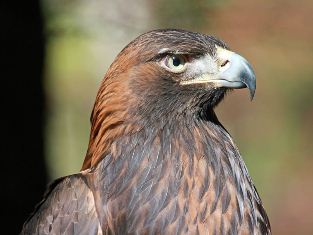 BEND, Ore. (AP) -- A proposed Central Oregon wind project is the first in the country to be considered for a permit that allows wind turbines to kill a few golden eagles so long as developers make up for the loss, federal officials say.
BEND, Ore. (AP) -- A proposed Central Oregon wind project is the first in the country to be considered for a permit that allows wind turbines to kill a few golden eagles so long as developers make up for the loss, federal officials say.
The West Butte Power project plans to retrofit power poles where wires are so close together that golden eagles can stretch their 7-foot wingspans and get electrocuted.
The U.S. Fish and Wildlife Service said the retrofits could mitigate the loss of any golden eagles killed by the 50-turbine wind farm east of Bend, The Bulletin reported (http://bit.ly/ADNYs2 ) Friday.
The permit would allow three golden eagle deaths over five years and require no net loss of the breeding population.
The agency said it was the first application it got under the terms of rules it adopted in 2009 under the Bald and Golden Eagle Protection Act.
Conservation groups had called for a permitting system to stop what one called Friday "a free-for-all that kills hundreds of thousands of birds each year."
The American Bird Conservancy said it would look hard at the details of the proposed West Butte permit to make sure it would avoid as many eagle deaths as possible and hews to the government's own rules.
Although surveys indicated few golden eagles at the wind farm site, it is at the kind of higher elevation they patrol in search of prey, about 5,000 feet.
Bald eagles nest about 10 miles from the project site, but a federal official said they typically focus on land near lakes or rivers.
"So we don't really expect bald eagles to be using that site," said Michael Green, acting chief of the division of migratory birds and habitat programs for the U.S. Fish and Wildlife Service in Portland. "There is nothing up there for them."
West Butte Power would retrofit 11 power poles a year or more depending on how many eagles are killed, Green said.
Each retrofit would cost $3,000 to $5,000, said John Stahl, managing partner of West Butte Power LLC, based in Southern California.
The U.S. Bureau of Land Management approved the road and power line in July on the condition that the company pays for restoration and enhancement of 9,000 acres of sage grouse habitat elsewhere. Stahl said the sage grouse habitat work will cost $1.4 million.
The project would provide enough power for about 50,000 homes, the company said.
The Fish and Wildlife Service is taking comments on the proposed permit until early next month. If the agency approves the permit and Congress extends green power tax credits this year, Stahl said, the turbines could be built in 2013.
---
Information from: The Bulletin, http://www.bendbulletin.com
© 2012 The Associated Press. All rights reserved. This material may not be published, broadcast, rewritten or redistributed. Learn more about our Privacy Policy and Terms of Use.
Portland and Seattle
Free Subscription to Breaking News
Free Subscription to Breaking News


















































































































































































































































































































































